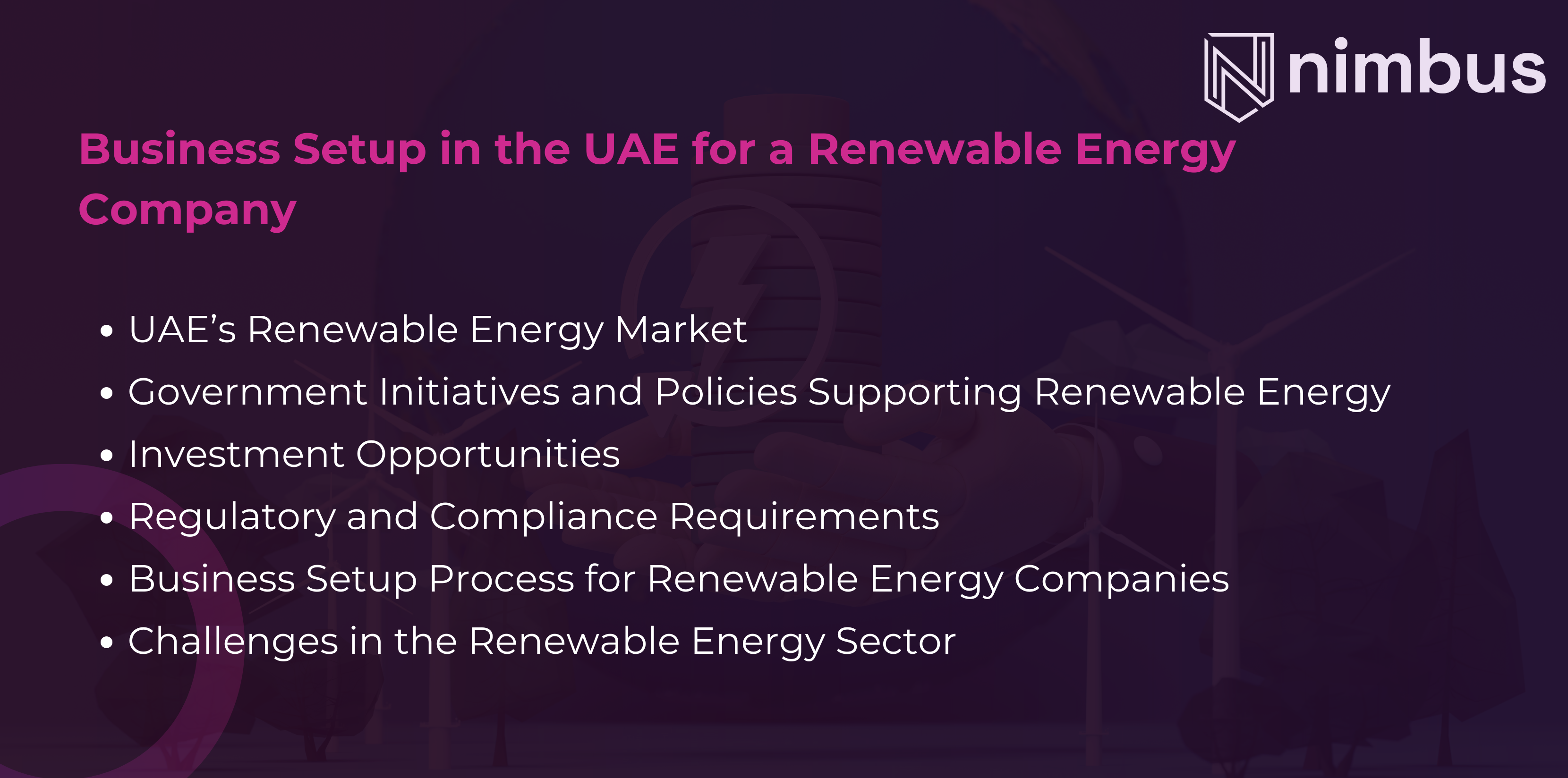Renewable energy is one of the many sectors in the UAE that is flourishing at a rapid rate. With ambitious targets set under the Net Zero by 2050 Strategic Initiative and other similar projects, the country is rapidly transitioning toward a greener future.
For businesses looking to enter the renewable energy sector, the UAE offers significant opportunities but also presents regulatory, financial, and operational challenges. Aspiring investors and companies must know the crucial factors for a successful business setup in the UAE in this sector.
This post acts as a guide for investors who are looking for business setup services in the UAE in this growing sector. It enlists the opportunities, challenges, and other related aspects.
Business Setup in the UAE for a Renewable Energy Company

1. UAE’s Renewable Energy Market
The UAE has become one of the fastest-growing markets for renewable energy in the region. Its commitment to reducing reliance on fossil fuels and increasing clean energy production has led to several government initiatives and large-scale projects.
Key Renewable Energy Goals in the UAE
- Achieve 44% clean energy in the total energy mix by 2050.
- Develop solar, wind, and waste-to-energy projects to support economic diversification.
- Increase energy efficiency in residential, commercial, and industrial sectors.
2. Government Initiatives and Policies Supporting Renewable Energy
The UAE government has introduced several policies and frameworks to support the growth of renewable energy businesses.
Key Initiatives
- Dubai Clean Energy Strategy 2050 – Targets 75% of Dubai’s power output from clean energy sources by 2050.
- Mohammed bin Rashid Al Maktoum Solar Park – One of the world’s largest single-site solar parks, expected to reach 5,000 MW capacity by 2030.
- Net Metering and Feed-in Tariffs – Encouraging rooftop solar panel adoption by allowing consumers to sell excess energy back to the grid.
3. Investment Opportunities
The UAE’s diverse climate and strategic location create multiple opportunities for investment in renewable energy projects.
Solar Energy
- Utility-Scale Solar Projects – The UAE’s high solar irradiation levels make it an ideal location for large solar farms.
- Distributed Solar Solutions – Rooftop solar installations for homes and businesses are gaining traction, supported by government incentives.
Wind Energy
- Onshore Wind Farms – Some coastal and elevated areas in the UAE have favorable wind conditions for energy generation.
- Offshore Wind – The Arabian Gulf presents opportunities for offshore wind farms, with potential for strong and consistent wind patterns.
Other Renewable Energy Sources
- Waste-to-Energy – With increasing urbanization, waste-to-energy projects are emerging as viable solutions to both waste management and energy production.
4. Regulatory and Compliance Requirements
Setting up a renewable energy company in the UAE requires navigating a structured regulatory framework.
Key Regulatory Bodies
- Ministry of Energy and Infrastructure (MOEI) – Oversees energy policies and regulations at a national level.
- Dubai Electricity and Water Authority (DEWA) – Responsible for energy supply, distribution, and renewable energy projects in Dubai.
- Abu Dhabi Department of Energy (DoE) – Regulates energy production and sustainability initiatives in Abu Dhabi.
- Regulatory and Supervisory Bureau (RSB) for Electricity and Water – Ensures compliance with energy policies in Dubai.
Compliance with Environmental Regulations
Renewable energy businesses must adhere to UAE federal environmental laws, including:
- Conducting Environmental Impact Assessments (EIA) for projects.
- Meeting ISO 14001 standards for environmental management.
- Aligning with UN Sustainable Development Goals (SDGs) related to clean energy and climate action.
Failure to comply with these regulations can result in delays, fines, or project cancellations.
5. Business Setup Process for Renewable Energy Companies
Establishing a renewable energy business in the UAE requires careful planning and adherence to legal and licensing requirements.
Steps to Register a Renewable Energy Company
Choose a Business Activity – Define whether your company will focus on solar energy, wind energy, consulting, or equipment manufacturing.
Select a Legal Structure – Options include:
- Limited Liability Company (LLC) – Best for medium-to-large enterprises with multiple stakeholders.
- Free Zone Company – Allows 100% foreign ownership and is ideal for export-oriented businesses.
- Branch Office – Suitable for foreign companies expanding into the UAE without a separate legal entity.
- Joint Venture (JV) – Collaboration between local and international companies for specific projects.
Reserve a Trade Name – Get approval for your business name, ensuring it meets UAE naming regulations.
Obtain Initial Approvals – Secure approvals from relevant authorities based on business activity.
Submit Legal Documents – Register with government entities and provide required documentation.
Obtain a Business License – Finalize registration and acquire a business license from the applicable free zone or mainland authority.
6. Challenges in the Renewable Energy Sector
Despite the many opportunities, businesses in the renewable energy sector may face several challenges.
Key Challenges
- Intermittency of Renewable Energy – Solar and wind energy depend on weather conditions, requiring investment in energy storage solutions.
- Water Scarcity Issues – Some renewable energy technologies require significant water use, which can be a challenge in the UAE’s arid climate.
- Complex Regulatory Framework – Licensing and approvals can be time-consuming due to multiple regulatory authorities.
- High Initial Investment Costs – Renewable energy projects often require significant upfront capital.
Final Thoughts
The UAE’s renewable energy sector presents exciting opportunities for businesses, supported by strong government initiatives, financial incentives, and growing market demand. However, companies must also navigate regulatory complexities, environmental compliance, and financial challenges.
While the UAE remains committed to a greener future, businesses looking to enter this space need strategic planning, regulatory compliance, and innovation for sustainable growth.



